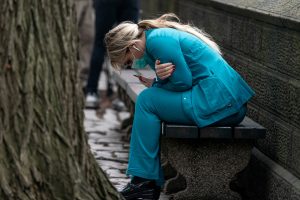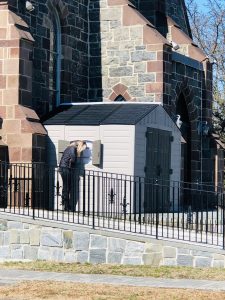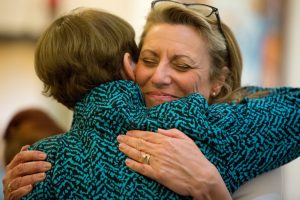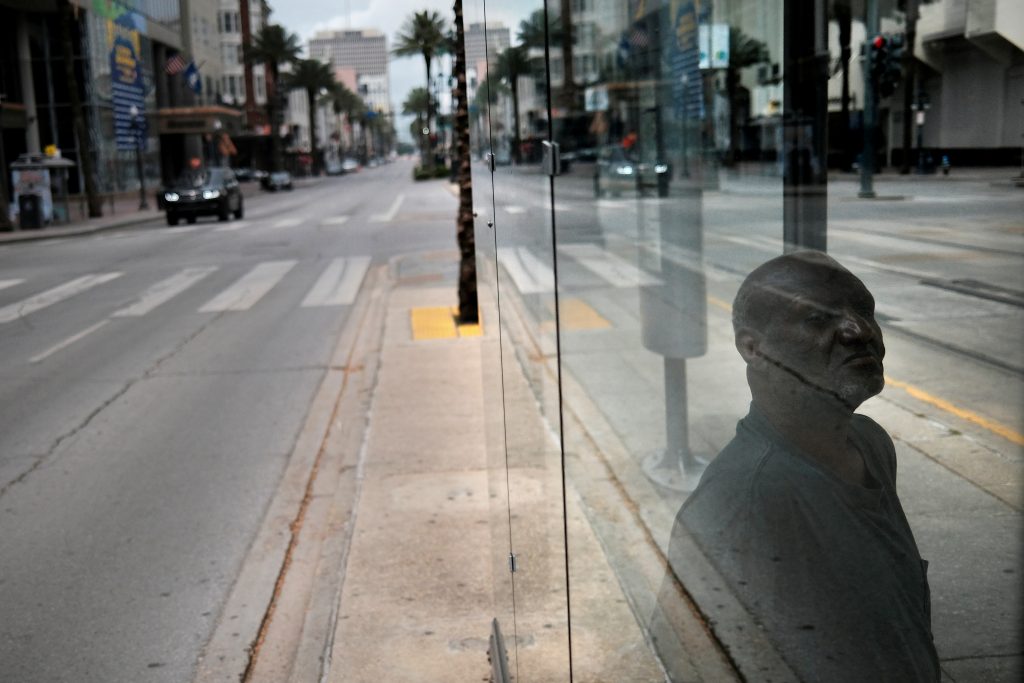The quarantine drags on.
Since the coronavirus (COVID-19) pandemic forced governments worldwide to enforce strict safety and travel restrictions more than a month ago, a new lifestyle of hunkering down at home, social distancing, and Zoom calls has emerged in many places.
Amid the disruptions, many have found solace in more family time and fewer activities to clutter the day. At the same time, increased reports of mental health struggles, alcohol abuse, pornography use, and domestic violence have raised concerns about the dangerous side of social distancing.
As a result, this underreported tidal wave of challenges has stretched thin many organizations working to assist those who are struggling, and has made efforts to provide hope more critical than ever.
‘Feeding anxiety’
In a time of uncertainty, economic strain, and isolation, the struggle to maintain sound mental health has afflicted individuals worldwide. According to the Wall Street Journal, a global support network offering free texting consultations reported a 40% increase in traffic in the U.S., Canada, and U.K. between March and April. About 78% of the text conversations discussed anxiety related to the coronavirus.
And there is indeed legitimate cause for concern. As a recent article in the medical journal Lancet noted, virus outbreaks can trigger serious psychological impacts, including depression, post-traumatic stress disorder, substance abuse, and self-harm.

Greg Kolodziejczak, Ph.D., a clinical psychologist in Cambridge, Massachusetts, has been dealing firsthand with a range of worries plaguing his patients. “First, [there have been] direct concerns about health and possible illness and death, both for the patient and for their loved ones,” Kolodziejczak told Angelus. “One of my patients, for example, is a health care worker, and while she’s mildly concerned for her own health, she’s far more concerned for the health of her elderly father, also a health care worker.”
Two other pain points are the virus’ blow against finances and former plans. But one of the most significant changes, said Kolodziejczak, is the lack of certainty. “Many people have a tendency to catastrophize,” he said, “and uncertainty about the future opens the door to catastrophization, which feeds anxiety.”
Since mid-March, Kolodziejczak has transitioned his work with patients entirely to telehealth consultations via Zoom. Although some have adjusted to the new system well, the mental health challenges remain for many. “There has been an increase in anxiety,” he said, “and also an increase in loneliness for many people.”
Isolation and alcohol abuse
While coping with loneliness can be difficult for all kinds of people, it poses a particular challenge for those fighting an addiction. This is precisely how the coronavirus has aggravated the threat of alcoholism.
While alcohol sales have jumped, addiction support centers have reported increased activity. Although this does not prove causation, the situation has raised concerns.
“This period of isolation might lead to a spike in alcohol misuse and, potentially, development of addiction in at-risk individuals or relapse in recovered addicted patients, therefore placing further strain on drug and alcohol services, and the health service in general, during and after the pandemic,” Dr. Matt Park of Portsmouth University told The Independent.
Amid the crisis, organizations such as Alcoholics Anonymous (AA) have had to adjust their work strategies dramatically. Tony M., a coordinator for the AA group at Holy Family Church in Marietta, Georgia, told Angelus in a phone interview that all meetings have transitioned to Zoom.
“We’ve got some older people that don’t really know how to work the electronics,” said Tony, who asked that his last name not be used. “And some people … just don’t like it. So they don’t show up.”
Tony added that among the members who do come to meetings, the vast majority of them now attend more often than ever. While he hasn’t encountered any relapse cases, he acknowledged the heightened challenge for those struggling with alcoholism. “For the most part,” he said, “because of the job layoffs, and just the fear in general … more people tend to be drinking more.”
The porn “masquerade”
Alcoholism isn’t the only addiction problem tightening its grip on society. Another silent yet sinister threat: pornography.
In mid-March, top porn site Pornhub reported a surge in worldwide traffic. When the site offered premium content for free to all of Italy in March, traffic there jumped 57% in a single day.
Later that month, Pornhub announced that it would make its premium content free worldwide for the next 30 days. While the company’s vice president Corey Price celebrated the move as a way to “lend a hand” by providing an “enjoyable way to pass the time,” the increased ease of access intensified the burden on addicted users.
NoFap, a “community-based porn recovery website,” recently shared anonymous testimonials of people trying to quit porn. One user in Spain posted, “Now that I’m at home all day, relapsing is much [easier]. Today I relapsed 3 times, when in the past normal weeks I used to relapse 1 or 2 times. Need help, this can get much worse if I don’t stop it now.”

Father Daniel O’Mullane of Our Lady of Mount Carmel Church does not find stories like these surprising. “The challenge is one of prayer and love,” he told Angelus. The pastor of the Boonton, New Jersey parish has made recent headlines for hearing socially distant confessions from within an 8-by-10-foot shed. While Father O’Mullane noted that his penitent population has been “in flux” lately, he confirmed that the coronavirus crisis has fueled many temptations and afflictions, including pornography.
“We’re lacking in real human interaction, at least outside of the home,” he said. “Love needs to be a big part of our lives. When it’s not, we settle for less. Pornography is a counterfeit good as far as love goes. Loneliness and anxiety are to be expected when we don’t have real human connection and when we feel that things are out of control (and we’re not yet surrendering to God).”
The mounting porn problem has also incensed organizations pushing back against the industry. “Pornhub … masquerades as a legitimate business by offering free access to its hardcore pornography library, which includes themes of incest, child [and] teen sexual abuse, and extreme violence,” wrote Jake Roberson, director of communications for the National Center on Sexual Exploitation (NCOSE), in an email to Angelus.
The national nonprofit organization advocates for human dignity and exposes exploitation in industries like sex trafficking, prostitution, and pornography.
Roberson also noted the series of psychological and relational damages porn can inflict, as research has repeatedly indicated. “I believe that this pandemic has further exposed the porn industry for its shameless and aggressive marketing,” he said, “and ultimately, this shines light on and exposes this dark industry.”
Vulnerable victims
Isolation and loneliness fuel a host of struggles, but for many, not being alone poses its own threat. While mental health and addiction support centers have received spikes in calls, so have support hotlines for domestic violence.
A recent report from the New York Times states that domestic violence reports have spiked in China, Spain, France, and Italy. “We’ve been getting some very distressing calls,” the founder of a domestic violence support organization in Spain told the Times. “[This shows] us clearly just how intense psychological as well as physical mistreatment can get when people are kept 24 hours a day together within a reduced space.”
As reports have increased, support centers have been working overtime to respond. Quarantine regulations have limited many shelters’ abilities to fundraise and house victims. Some have had to book hotel rooms to house people, taking on both a logistical and financial burden.
In the Archdiocese of Los Angeles, the Victims Assistance Ministry has been juggling its own challenges as it works to continue assisting victims of all kinds of abuse.
“Our primary concern is that victim-survivors not lose touch with their support system,” Heather Banis, Ph.D., the ministry’s coordinator, told Angelus. “To that end, we have suspended our longstanding policy requiring [that] all therapy sessions be in person and are now allowing, temporarily, telehealth sessions utilizing HIPAA-compliant digital platforms.” The transition to a completely remote system has proved difficult, Banis added, especially as staff work to process therapist payments while away from office equipment.

In an effort to support all kinds of victims, the Victims Assistance Ministry organized a nine-day series of prayer for healing, entitled “United Together.” Originally meant to gather people at various locations throughout the diocese, the novena’s daily prayer services were livestreamed in accord with social distancing regulations. While this prevented local parishioners from attending in person, said Banis, it also allowed this spiritual resource to reach across the country.
“As sexual abuse knows no limits, geographically or institutionally,” she said, “we wanted to invite all of the Archdiocese of Los Angeles into prayer as a sign of our awareness of, and concern for, those harmed.”
Unearthing hope
Problems abound, and resources are bleak — but the determination to offer help persists.
For Kolodziejczak, the greatest remedy he can offer his patients is a sincere human relationship. “The foundational resource I offer is a deep and trusting personal connection; all else builds on that,” he told Angelus. “The primary way that people regulate their emotions is through interpersonal relationships, so I try to be a non-anxious presence in an anxious environment, providing what that particular patient needs.”

For Tony, the effort to support those in his AA group is just as consistent as ever, if not more so. “It’s the same as always,” he said. “Primarily reaching out and talking to them, or getting them to talk to you. We’re just doing it more frequently.” For those seeking hope, he encouraged them to “put faith in their higher power … whatever they believe in.”
NCOSE’s Roberson urged those fighting porn addiction to take advantage of the NCOSE Resource Center for recovery support. “We want you to know that there is hope and there is help available for you.”
And in addition to the host of online, telehealth, and other requested resources that LA’s Victims Assistance Ministry provides, Banis emphasized the importance of prayer when helping the suffering to persevere. “We share messages of hope,” she told Angelus, “offer our prayers, and pray with victim-survivors and all those struggling in the midst of this pandemic.”
Father O’Mullane couldn’t agree more. When it comes to maintaining hope, “There’s no substitute for prayer,” he told Angelus. “There never was, but now that we’ve had everything taken away, perhaps we’re ready to realize how central prayer needs to be in our day-to-day lives.”

